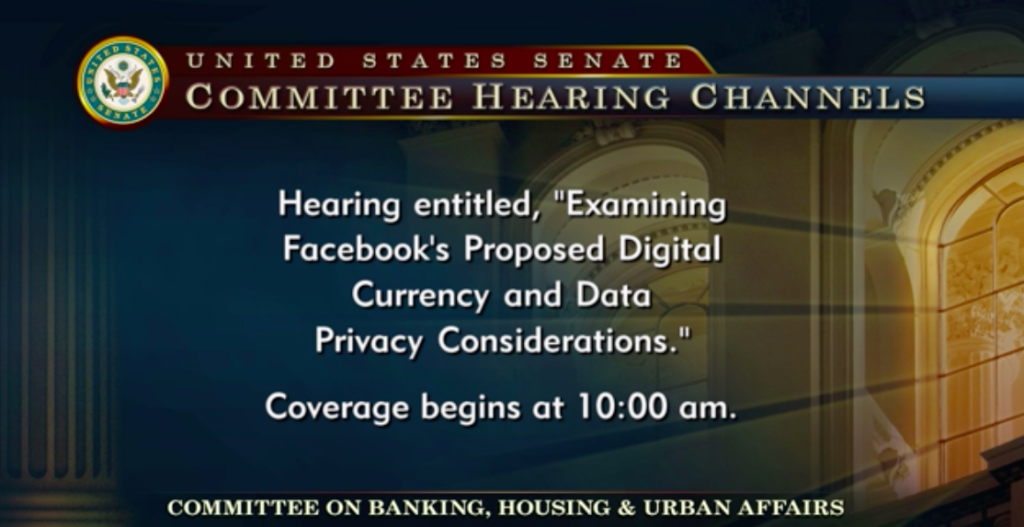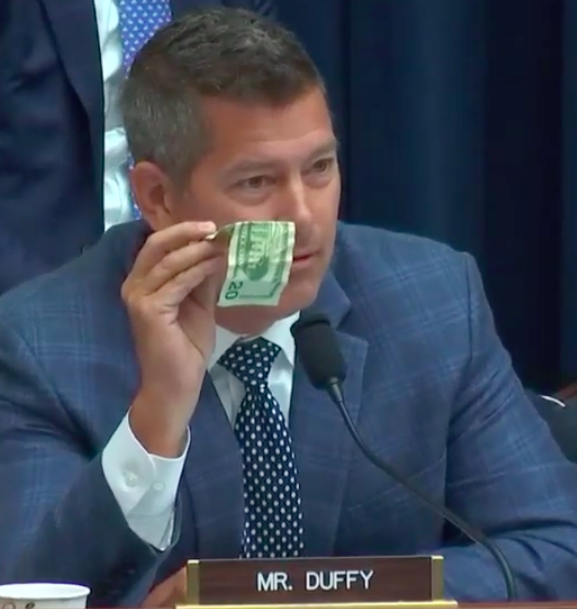
On July 16, 2019, a Senate Panel lobbed missives across the Libra bow when questioning David Marcus, the head of Facebook’s Calibra subsidiary. As suggested by the title of the hearing – “Examining Facebook’s Proposed Digital Currency and Data Privacy Considerations”, today’s hearing was really all about Facebook and not about digital currencies or blockchain technologies in any broader context.
Using a tone that permeated for much of the hearing, Sen. John Kennedy ignored Facebook’s participation in a Swiss Association that purportedly leaves Facebook with little control over Libra and instead mocked: “Facebook wants to control the monetary supply. What could possibly go wrong?” Sen. Sherrod Brown (D-OH) reinforced this lack of trust when he said that Facebook was dangerous because it did not “respect the power of the technologies they are playing with, like a toddler who has gotten his hands on a book of matches, Facebook has burned down the house over and over, and called every arson a ‘learning experience.'”
Sen. Brian Schatz summed up the mood nicely when he recognized: “You’re making an argument for cryptocurrencies generally. The question is not, ‘Should the U.S. lead in this?’ Why in the world, of all companies, given the last couple of years, should [Facebook] do this?”
On a more substantive side, the hearing was driven by a concern for privacy rights. As reported in The Wall Street Journal, Mr. Marcus suggested that Facebook would not monetize users’ data related to Libra because no financial or account data from the Libra network would be shared with Facebook: “We’ve heard loud and clear from people, they don’t want those two types of data streams connected.”
Even though it did not garner much public analysis, Chairman Crapo’s Statement provides an important privacy perspective that may also set the table for future legislative action: “Individuals are the rightful owners of their data. They should be granted a certain set of privacy rights, and the ability to protect those rights through informed consent, including full disclosure of the data that is being gathered and how it is being used.”
And, despite all of his protestations to the contrary, in his own prepared testimony, Mr. Marcus actually provides a rough roadmap detailing how the financial and transactional data obtained by Calibra could directly bolster Facebook’s data surveillance revenue.
Specifically, Mr. Marcus states: “The Calibra wallet will let users send Libra to almost anyone with a smartphone, similar to how they might send a text message, and at low-to-no cost. We expect that the Calibra wallet will ultimately be one of many services, and one of many digital wallets, available to consumers on the Libra network. We do not expect Calibra to make money at the outset, and Calibra customers’ account and financial information will not be shared with Facebook, Inc., and as a result cannot be used for ad targeting. Our first goal is to create utility and adoption, enabling people around the world— especially the unbanked and underbanked—to take part in the financial ecosystem. But we expect that the Calibra wallet will be immediately beneficial to Facebook more broadly because it will allow many of the 90 million small- and medium-sized businesses that use the Facebook platform to transact more directly with Facebook’s many users, which we hope will result in consumers and businesses using Facebook more. That increased usage is likely to yield greater advertising revenue for Facebook.”
To suggest that the mere ancillary use of Facebook’s platforms by Calibra users will alone cause an increase in advertising revenue makes little sense. The only way Calibra will yield greater “advertising revenue” to Facebook is directly related to the well-understood increase in value user data would have after alignment takes place between transaction data and the other data obtained from Facebook’s platforms and services. Indeed, advertisers have long recognized that personalization data is not nearly as useful as relevance data.
A long-term goal of Facebook’s Libra project, namely combining user data with associated financial and transactional data, should not be considered well-hidden. Mr. Marcus’ written testimony all but confirms Facebook will eventually harvest transactional and KYC data: “Calibra will not share customers’ account information or financial data with Facebook unless people agree to permit such sharing.” Indeed, Sen. Pat Toomey specifically asked Mr. Marcus whether Facebook intended to seek user consent to monetize Calibra-derived financial data and Mr. Marcus incredibly responded: “I can’t think of any reason right now for us to do this.” Really?
Facebook likely only has to ask and it will get whatever user permissions necessary to satisfy existing regulatory and statutory requirements. Depending on the ultimate success of Amazon’s recent $10 offer for tracking data, Facebook may not even need to give much in return for such consent. In other words, once this particular genie is let out of the bottle there will likely be no turning back and any unencumbered launch of Libra might very well be the death knell for data privacy as we know it.
UPDATE: July 18, 2019
House Financial Services Committee Hearing of July 17, 2019
One major difference between the Senate hearing conducted on July 16, 2019 and the House Financial Services Committee hearing of July 17, 2019 was the sort of testimony provided by industry experts. Even though the Senate smartly sought testimony from Wall Street and blockchain industry expert Caitlin Long, unlike with the House, there were no one educating the Senate on Calibra’s privacy issues.
For example, MIT Professor Gary Gensler’s prepared House testimony lays out a number of questions regarding privacy that Facebook should answer at some point: “We know that many of the most intrusive privacy practices of concern to privacy regulators have actually been subject to some form of consumer consent. So, it will be essential to conduct a more thorough analysis of what uses of Libra data should be allowed and which uses should be prohibited. How would such restrictions be monitored and enforced? What are the limited exceptions and might Calibra broadly seek customer consent in the form of standard user agreements? It would be likely that Calibra would want to commercialize this data. At a minimum, without sharing the raw transaction data from customers’ Calibra Wallets, it would still likely analyze such data to earn money either through advertisements or by offering targeted services to wallet holders.”
As well, in the prepared written testimony of Robert Weissman, President of Public Citizen, there is a long discussion explaining why Facebook is a “Corporate Surveillance Leviathan” that cannot be trusted with the proposed Calibra wallet.

The House Hearing also raised the issue of whether Facebook would be able to pick and choose users of the Calibra wallet – potentially forcing persons to conform their behavior to Facebook standards. In one highlight of the House Hearing, Congressman Sean Duffy waved a twenty-dollar bill in the air while making the point that anyone, including persons who say horrible things, can use a twenty-dollar bill but: “Who can use Calibra?” In response, Mr. Marcus pointed out anyone who could satisfy Calibra KYC requirements – which then begged the loaded follow-up question from Congressman Duffy: “Could Milo Yiannopoulos and Louis Farrakhan use Calibra [given they are both banned from Facebook]?” In response, Mr. Marcus said that an applicable policy hasn’t yet been written but that it was “an important question that [Facebook] needed to be thoughtful about.”
Given Facebook’s poor track record – indeed, former Facebook executives readily acknowledge Facebook holds too much market power and should not be trusted going forward, these and other “important questions” must be answered as soon as possible.